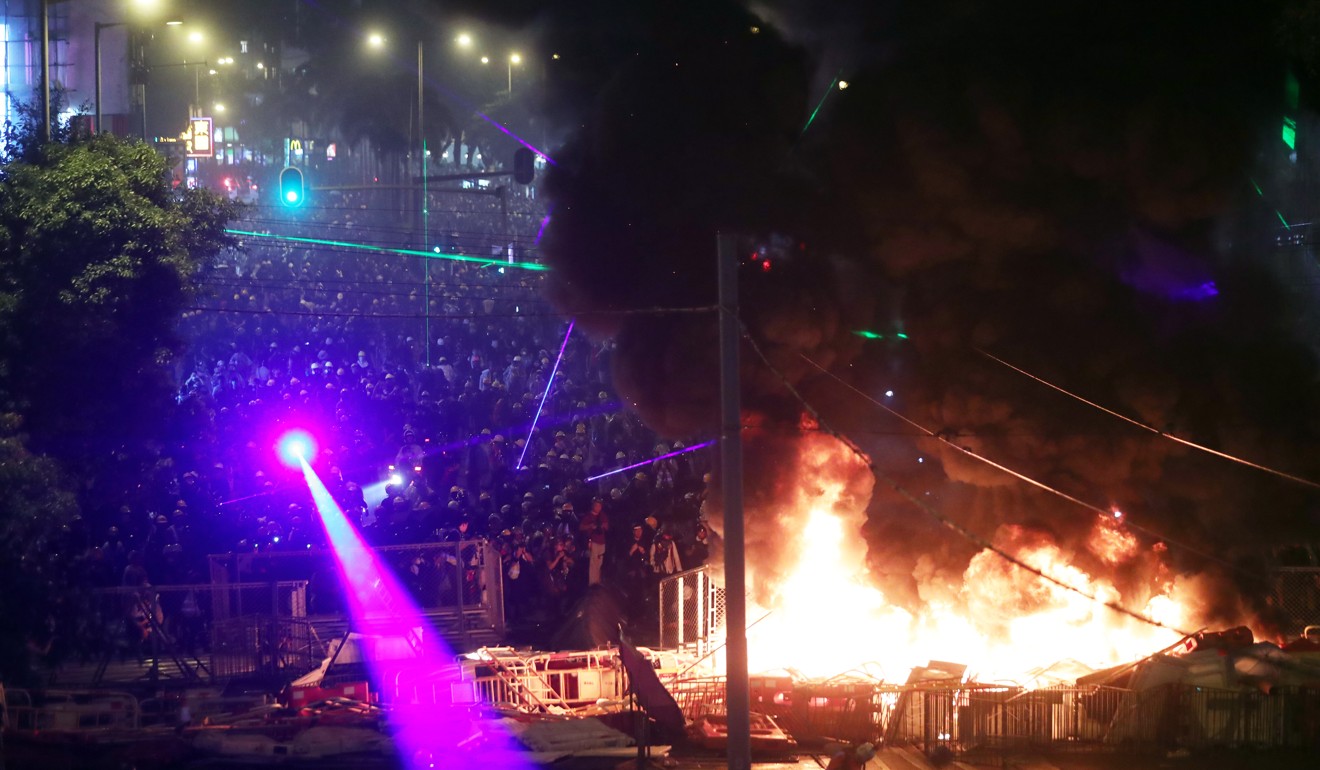
Carrie Lam hits back at Fitch downgrade of Hong Kong’s credit rating amid anti-government protest turmoil
- City drops from AA+ to AA, its outlook switching from stable to negative
- Hong Kong leader slams move, saying government is stopping violence and chaos
One of the world’s biggest credit-rating agencies downgraded Hong Kong’s sovereign rating on Friday as persistent protests put the “one country, two systems” principle to the test, a move rebuked by Chief Executive Carrie Lam Cheng Yuet-ngor.
Fitch Ratings dropped the bombshell by downgrading the city’s rating one notch from AA+ to AA and the city’s outlook from stable to negative, which will have implications for the borrowing costs of companies and the government.
Fitch said ongoing events had inflicted long-lasting damage to international perceptions of the quality and effectiveness of Hong Kong’s governance system and rule of law, and called into question the stability and dynamism of its business environment.
Speaking on an official visit in Guangxi, Lam suggested Fitch was wrong.
“We disagree with Fitch. That is because what happened in the past few months did not undermine ‘one country, two systems’ at all,” she said.
“Until now, and in the future, we have been firmly upholding, and will uphold ‘one country, two systems’ as our top principle in stopping violence and chaos.”
It is only Hong Kong’s first downgrade in rating by Fitch since 1995, though the latest rating still means the third highest investment grade.
The city has been rocked for nearly three months by anti-government protests, sparked by opposition to a since-withdrawn extradition bill. The unrest has involved rallies, occupations, marches and strikes, many of which have ended in violent clashes between protesters and police.

The announcement was made just before the end of morning trading, with the Hang Seng benchmark index closing the day up 175 points, or 0.66 per cent, at 26,690.76.
Some analysts said the move could adversely affect government-backed enterprises such as rail operators MTR Corporation, and the Kowloon-Canton Railway Corporation, which are regular corporate borrowers and enjoy the same rating with the city.
Fitch is the first of the big three credit rating agencies to downgrade the city’s sovereign rating, with rivals S&P Global ratings, and Moody’s Investors Service, declining to say if they would make a similar move. They are all American companies.
Citibank says credit card spending dropped amid Hong Kong protests
The rating firm pointed out that the ongoing demonstrations inflicted “long-lasting damage” to international perceptions of the quality and effectiveness of Hong Kong’s governance system, and rule of law, and has called into question the stability and dynamism of its business environment.
Fitch said these features were at risk of being further eroded by the continued civil unrest, even though in a global context, the city’s creditworthiness remained strong.
It said the city faced an even more challenging economic landscape, as protests dealt a blow to local business and the city’s economy, already weakened by the trade war between the United States and China.
Fitch forecast the city’s gross domestic product would shrink to zero this year from 3 per cent growth last year.
“We also expect the budget surplus will narrow to roughly zero this year, in light of recently announced fiscal support measures, and our anticipation that revenues will underperform budget forecasts,” Fitch said.
Hong Kong is undergoing its worst political crisis since the handover of its sovereignty to China in 1997. The present crisis was triggered by the extradition bill, which would have allowed the transfer of fugitives to jurisdictions the city did not have an agreement with, including mainland China.
On Wednesday, Lam, announced the legislation would be formally withdrawn, meeting one of the five demands made by anti-government protesters.
Despite the business community describing her move as an attempt to make peace, protesters have continued to demonstrate over the past two days and have threatened to block Hong Kong International Airport again on Saturday, as they press for the chief executive to meet their remaining four demands.
Lam said some of the protesters’ demands, such as to grant amnesty to all protesters arrested, were deemed to undermine the rule of law.
“If the government accedes to such demands, I am afraid that the international perception of our rule of law would be even more negative,” she added.
The city’s chief executive squarely blamed protesters for causing the chaos, which in turn had damaged the city’s reputation overseas and the business environment.
“That’s why every citizen who cares about Hong Kong, who sees Hong Kong as our home, should stop the chaos and violence as soon as possible,” Lam said.
Bill’s withdrawal ‘is first step’ in getting Hong Kong back to business
These include an independent inquiry into the police’s use of force, and releasing protesters arrested or charged for taking part in past demonstrations.
Francis Lun Sheung-nim, chief executive of brokerage GEO Securities, said he was not surprised at the downgrade.
“Hong Kong has recently become chaotic,” he said. “The downgrade will hurt investors’ perception on Hong Kong and will affect major corporate borrowers.”
However, he does not think the downgrade will affect Hong Kong government too much on the back of its strong surplus.
Although S&P has not adjusted Hong Kong’s credit rating, it warned on Thursday of rising negative weight on the city’s banks, as the protests exacerbated the economic drag of the US-China trade war and the mainland’s slowing growth. But it expected Hong Kong banks would weather the impact.
Kimmy Chung is reporting from Guangxi


